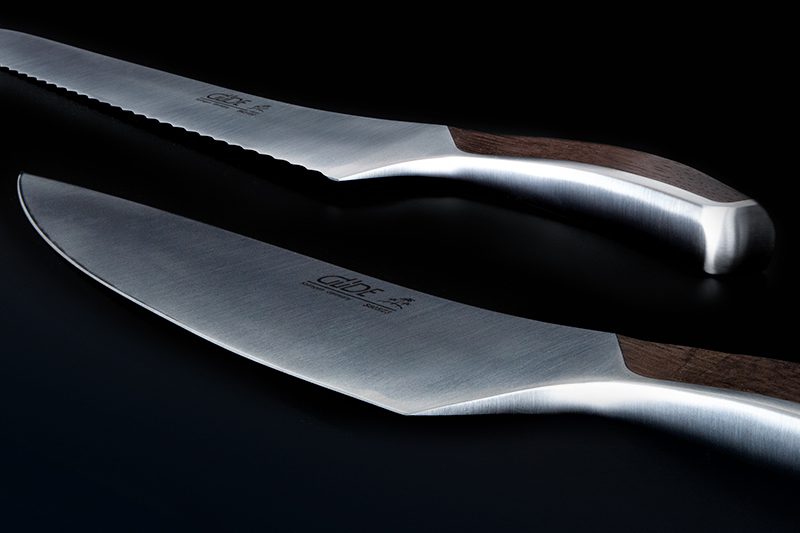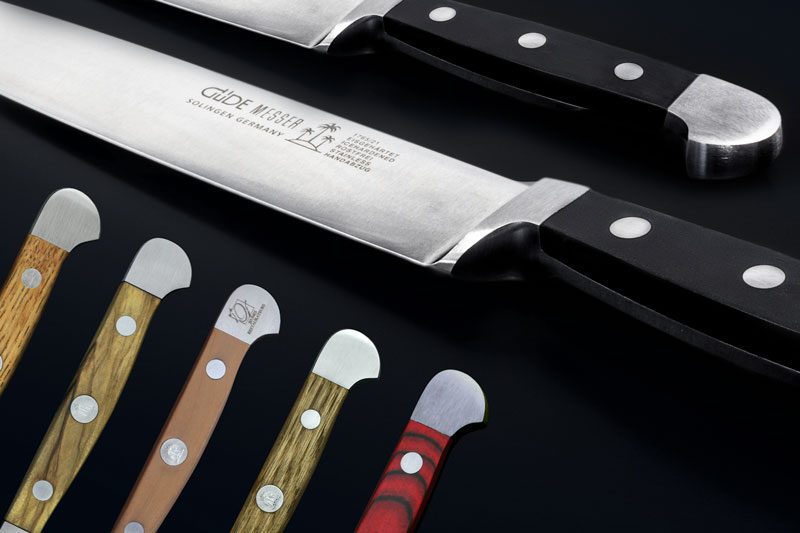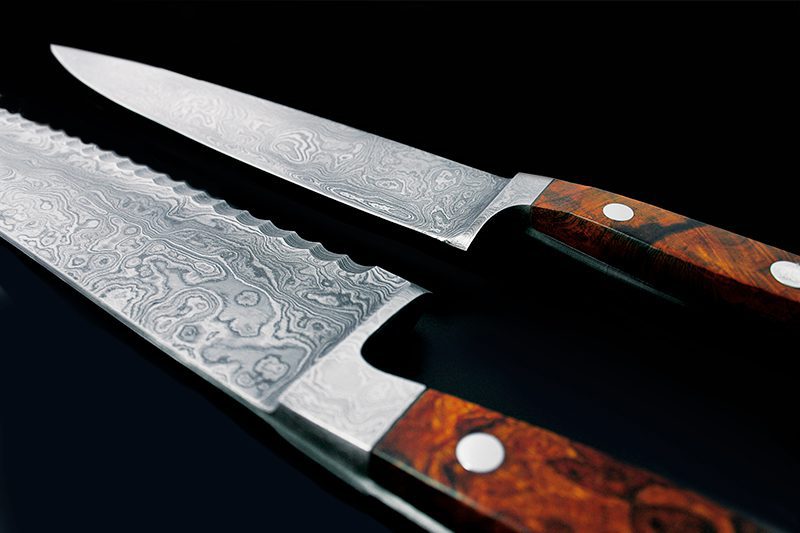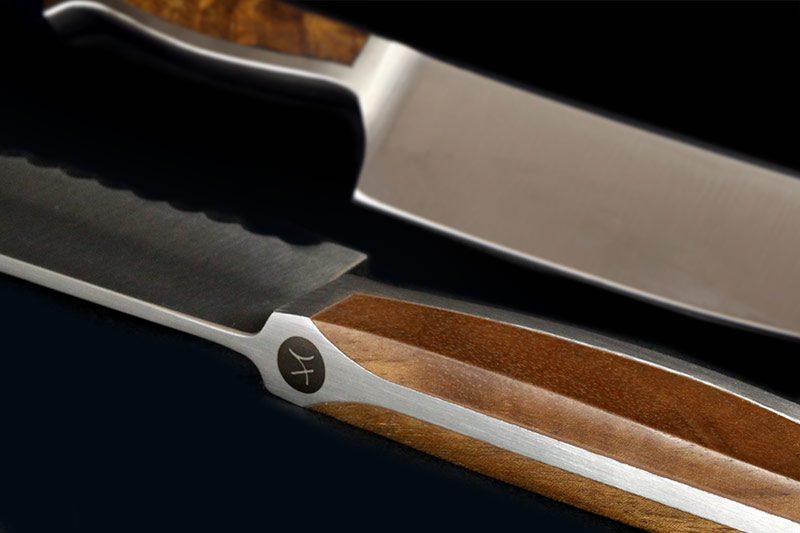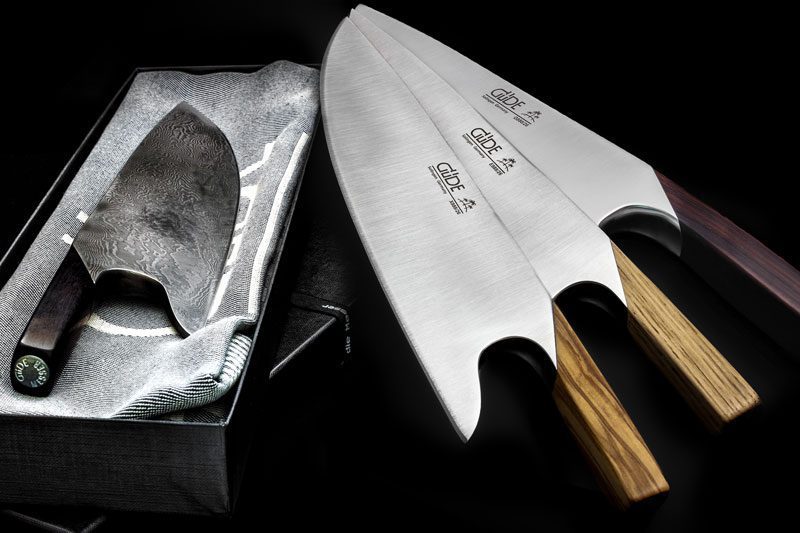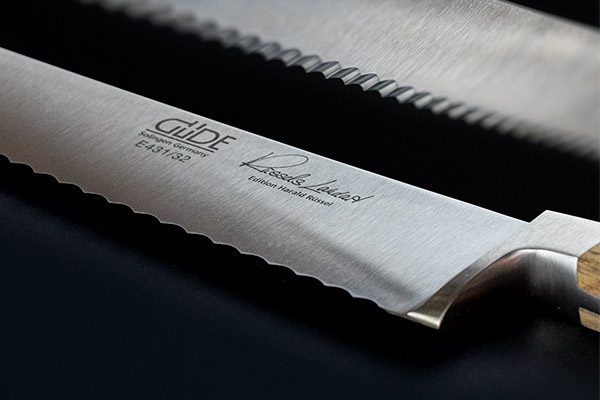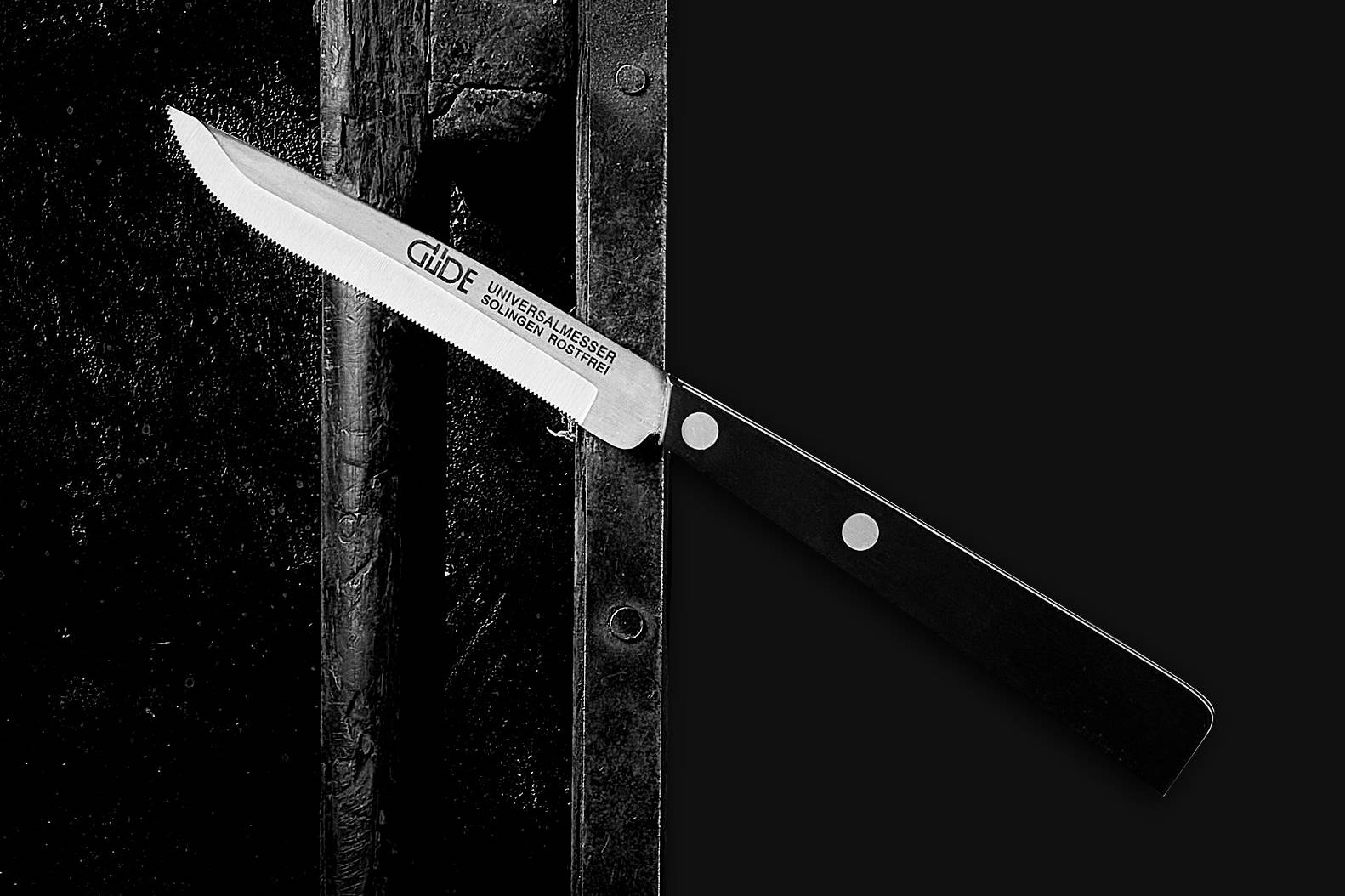KAPPA
The knives in the Kappa series are perfect for professional and amateur chefs because they meet the requirements of the guidelines for knives for use in the catering industry. The knives in the Kappa series are hand-forged from a single piece of chrome-vanadium-molybdenum knife steel and then finished in over 30 manual operations.
They are stainless, ice-hardened and dishwasher-safe and offer unique weight distribution and balance thanks to the all-metal design. The traditional way of manufacturing and the innovative, high-quality design earned the series Kappa the Red Dot Design Award. Thanks to the all-metal design, they are even dishwasher safe.
Material
The blade material of knives has to meet a wide range of requirements, some of which are contradictory. It is therefore important to achieve an optimum between the different requirements. A knife steel should be hard, but not too hard, otherwise it would break. But it should also not be too soft, otherwise the knife would become blunt too quickly through wear. That is why the knives in the Kappa series from GÜDE are made of a chrome-molybdenum-vanadium knife steel that has an optimum hardness of approx. 57-58 HRc (Rockwell).
The hardness of the knife steel of the series Kappa of 57-58 HRc is optimal for the different requirements that a good knife must fulfil.
Thanks to this hardness, the blade of the Kappa series knives is torsionally stiff and thus guarantees exact guidance of the knife and thus a precise cut. But even a hard steel, such as GÜDE knife steel, can be very flexible when ground very thin. A flexible blade like that of the Kappa fillet knife is particularly suitable for filleting fish by moving the blade back and forth between the skin and the fillet with a slight bend.
Production
Knives in the Kappa series are drop-forged from one piece of steel. Drop forging ensures high material strength even under dynamic stresses. During drop forging, the entire forging blank is heated and deformed. In up to 30 further steps, the forged blank is turned into a unique handmade knife from the knife manufactory GÜDE.
After the knives have been roughly ground, calibrated and cleaned, the so-called ice-hardening process follows: the knives are cooled to -80 °C to improve the microstructure in the blade steel. In the next step, the knives are tempered in two stages, i.e. heated again and thus made unbreakable. The blade is then pre-ground, followed by pre-grinding of the back of the knife. This is followed by the fine grinding of the back of the knife and the sharpening of the bolster. The inside of the handle is now pre-ground. Pre-grinding of the bolsters is done in 5 steps. This is followed by the fine grinding of the blade. This is also called "pliestening". Now the back of the knife gets the finest grinding. The fine grinding of the front bolster follows and the knife handles are pre-polished. The handles are then finely polished. Then the knife edge, also called the bevel, is ground (honed) and the trigger is polished. The special GÜDE serrated edge is now applied to the bread knives, and the bolster to the dishing knives. Tomato, cheese and steak knives get their serrations. In the next step, the GÜDE logo is etched onto the blade. Then the knives are cleaned and the quality is checked. After that, the knives are placed in a sheath to protect them. Finally, the shipping bags are fitted with rivets and appropriate labels. The finished knives are now sent to the warehouse for shipping.
Form
In drop forging, the design language is free from the tip of the blade to the end of the handle. A design language like that of Kappa is only possible in the drop-forging process. That is why GÜDE has remained true to this proven technology since its founding in 1910, now in its fourth generation.
An unmistakable feature of many series from GÜDE is the so-called double bolster. A bolster is the thickening of the blade steel. The (front) bolster between the handle and the blade serves both as finger protection and balance weight.
The second bolster at the end of the handle gives the knives a better balance. This guarantees the user pleasant and fatigue-free work.
On the knives in the Kappa series, the front and back bolsters merge seamlessly into the handle. This is because the knives in the Kappa series are forged from one piece of steel from the tip of the blade to the end of the handle. This results in a unique weight distribution and balance.
No seam, no material transition - simply drop-forged from one piece.
Function
A good knife must be sharp, stay sharp, fit well in the hand and be balanced so that fatigue-free and safe work is guaranteed at all times.
The hardness of the GÜDE blade steel with approx. 57-58 HRc (Rockwell) and the GÜDE bevel angle of approx. 33 degrees ensure optimum sharpness and edge retention of the Kappa series. The shape of the all-metal handle and the double bolster typical of GÜDE guarantee perfect handling and balance of the knives in the Kappa series.
In terms of sharpness and edge retention, the bevel angle is of particular importance: because cutting is "physically" the driving of a wedge through a material to be cut. The more acute the angle of the wedge, i.e. the bevel angle, the better this works. The blade angle is the knifemakers' term for the cutting edge, i.e. the sharply ground part of a knife. A sharp bevel angle makes a knife sharper than a dull bevel angle. However, if the bevel angle is too acute, the bevel can break. That is why the knives in the Kappa series from GÜDE have an optimum bevel angle of approx. 33 degrees. This angle guarantees sharpness and stability at the same time. The chrome-molybdenum-vanadium knife steel of the Kappa series with its hardness of approx. 57-58 HRc (Rockwell) ensures that the sharpness lasts for a long time. The prerequisite is cutting on a suitable cutting surface, e.g. wood or plastic. The proverbial balance of the knives in the Kappa series comes from the double bolster in combination with the all-metal handle. This creates a counterweight to the blade in the handle area. For the user, this means perfect balance and fatigue-free work. A secure grip is always guaranteed. The front and rear bolsters enclose the hand and protect it from slipping, even when greater force is applied. The knives in the Kappa series deliver what both professional chefs and ambitious amateur cooks expect from a perfect knife. And thanks to the all-metal handle, they are also dishwasher-safe. Handmade, drop-forged from one piece, with the experience of centuries of Solingen knifemaking.
Our knife series
We value individuality - especially in the development and optimisation of our knife series. This is reflected in every single blade that leaves our manufactory, in the selection of particularly beautiful and tactile handle materials and a unique ergonomic design that fluently enables and celebrates fast, precise work.
Discover knife icons
THE KNIFE.
Our THE KNIFE. lives up to its name: this all-rounder was conceived, developed and forged by us with a particular focus on perfect ergonomics. Its special shape and balance ensure an automatic over-grip of the hand, which encloses the blade when cutting and thus finds a quasi natural extension in THE KNIFE.
Güde Bread knife
Developed in 1941 by the heir to the manufactory Franz Güde , the special "GÜDE serrated edge" of our bread knives today delights bakers and bread lovers all over the world. The pointed teeth of the unyielding, sharply ground chrome-vanadium-molybdenum steel ensure that breads, baguettes and rolls can be sliced instead of squashed, but also cabbages, melons and crispy crusted roasts can be cut more easily than ever. Unadorned, beautiful handles made of different high-quality materials do the rest for this knife legend of ours.
Utility knife
Our compact all-round talent is handy and effective - not only when it comes to precise work with smaller items. Its fine serration and double-sided hollow grinding make our universal knife the ideal companion for peeling, cutting and slicing vegetables, meat, fruit and co.

























